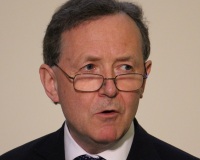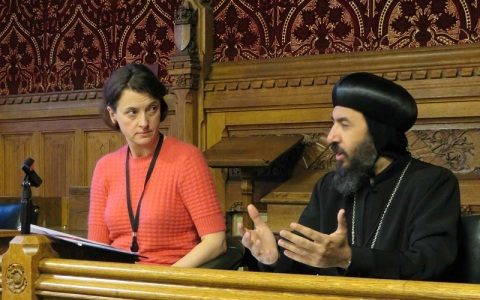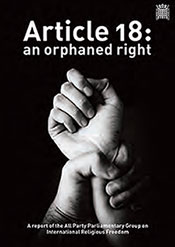ANALYSIS Surge in UK's concern for international religious freedom
by - 15th July 2015
 THE social contract . . . limits on power . . . liberty of conscience . . . doctrine of toleration . . . human rights . . . Each is under attack around the world and Lord David Alton wants the government to do something about it.
THE social contract . . . limits on power . . . liberty of conscience . . . doctrine of toleration . . . human rights . . . Each is under attack around the world and Lord David Alton wants the government to do something about it.
The Independent Crossbench Peer has tabled a debate in the House of Lords this Thursday (16 July) to focus on the issue that underpins them all: religious freedom.
Alton has framed the debate to focus on the ‘clear links’ between freedom of conscience and both the prosperity of a nation and the litany of other rights its citizens enjoy.
It will also discuss ‘greater political and diplomatic priority’ in support of Article 18 of the UN’s Universal Declaration of Human Rights, guaranteeing freedom of thought and religion.
One debate participant is Lord Jonathan Sacks, former UK Chief Rabbi. Addressing a UK-Israel policy conference in late June he noted that ‘wars are won by weapons, but peace is won by ideas.’
And each of the above principles which shape the modern world, he said, ‘began life as religious ideas.’
Within the UK the debate over secularism may question the value of this assertion. But it is undeniable that international religious freedom has received greater attention across the political and social spectrum.
Rhetoric
Richard Honess is a board member of Atheists Alliance International and the international liaison officer for Atheism UK. Dr David Landrum is the director of advocacy for the Evangelical Alliance.
Unlikely bed-fellows, both have spoken forcefully in support of religious minorities around the world.
‘The right to religious freedom is essential,’ Honess told Lapido. ‘All we ask is in return that atheists also have that same right, the right not to believe.’
Honess finds the UK guilty of privileging Christianity and believes the foundation of freedoms to be personal liberty under the law—not faith. He looks at Africa and the Islamic world and finds witch hunts against homosexuals and the lashing of dissidents in the name of religion.
‘The Atheist Alliance International will continue to lobby the EU and the UN,’ he said, ‘but this has to stop and I fear that we are long way from that.’
Landrum, on the other hand, released a report to Parliament detailing how UK Christians’ freedoms are ‘restricted’. But he sees religious liberty as receiving a far higher profile than it used to, driven by horrors witnessed in the Middle East.
‘We need to educate society about the value of religious freedom for all freedoms,’ he told Lapido, ‘and keep our politicians focused on persecuted minorities abroad.’
A growing and influential segment of these politicians sees this as their key mission. The All Party Parliamentary Group for International Freedom of Religion or Belief was formed in 2012, and is co-chaired by Baroness Elizabeth Berridge.
In addition to a host of Christian organisations, it is supported also by the British Humanist Association and Sikh, Bahai, and Ahmadiya Muslim groups.
‘The level of awareness and involvement among MPs on issues of international freedom of religion was higher in the last parliament than at any point in the past twenty years, and there is every evidence that this is just as true now,’ said Stephen Rand, advocacy consultant for Open Doors and web editor for the APPG.
The election manifestos of the Conservative, Labour, Liberal Democrat, DUP, and Green parties all included language supporting religious freedom abroad.
‘But it is too early in the life of this government to judge whether the rhetoric will become reality,’ Rand added.

One sign of the rhetoric is the recent honour given to Coptic Orthodox Bishop Angaelos, appointed Officer of the Order of the British Empire by the Queen for his services to international religious freedom.
‘Greater acknowledgment of this issue,’ Angaelos told Lapido, ‘is fitting within the UK’s understanding of what it means to safeguard human rights.’
It was ‘imperative’, he added, for both individuals and nations to protect them.
Reality
There are signs the UK government is getting the message.
According to the Pew Research Center, 76 per cent of the world’s population live in countries with high or very high restrictions on religion.
The 2011 Foreign and Commonwealth Office Report on Human Rights and Democracy found that religious freedom was ‘crucial to ensuring conflict prevention and post-conflict peacebuilding.’ It has since been updated to include ‘countries of particular concern’, numbering 27 in the most recent edition.
Put negatively, the June 2015 volume of the Harvard International Law Journal noted ‘nations that criminalise blasphemy tend to foster an environment where terrorism is more prevalent, legitimised, and insidious.’
The FCO report insists it is ‘important’ to secure religious freedom as part of the government’s ‘wider security agenda’.
 The report was quoted in ‘Article 18: An Orphaned Right’, prepared by the APPG in 2013. It will form the basis of the coming House of Lords debate.
The report was quoted in ‘Article 18: An Orphaned Right’, prepared by the APPG in 2013. It will form the basis of the coming House of Lords debate.
It also contains ten recommendations to the government on how to ‘mainstream’ a religious freedom approach into foreign policy.
One year later Baroness Warsi chaired the first meeting for the Foreign OfficeAdvisory Group on Freedom of Religion or Belief, fulfilling recommendation three.
An additional three have been positively acted upon, with evidence suggesting all have been considered.
But is advice enough? Do reports translate into policy?
Lord Alton continues to push the debate. His own view is clear: ‘Countries have to make the cause of those who suffer for their religion or belief the great cause of our times,’ he wrote in GIS.
‘Christians, Jews and Muslims privileged to live in free societies have to challenge cold indifference and speak up and defend humanity.’
Read a full transcript of the July 16 debate here>>
